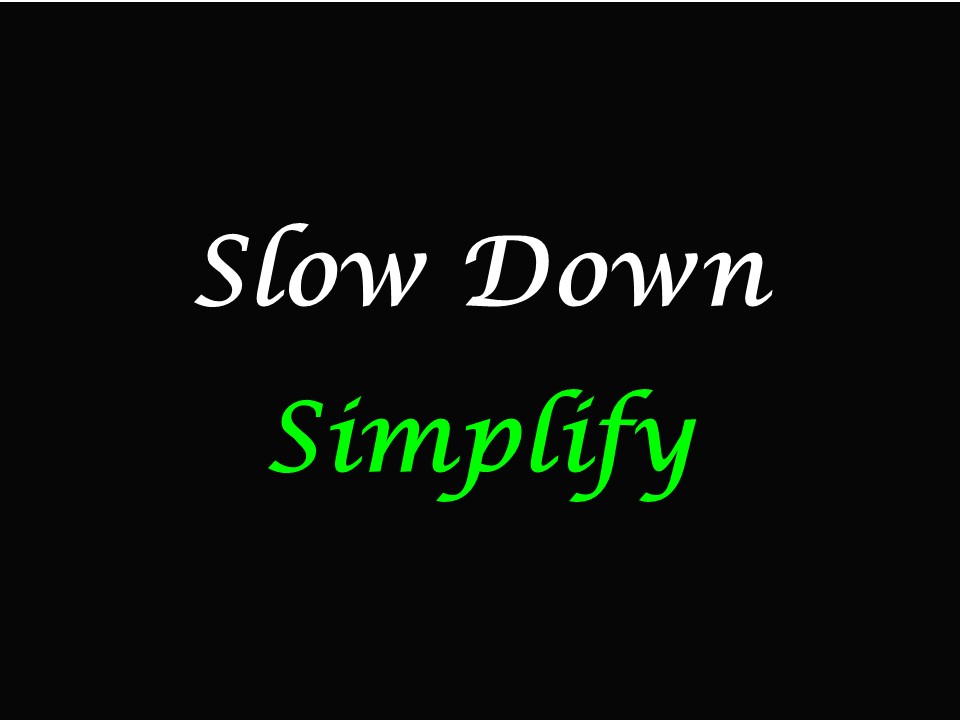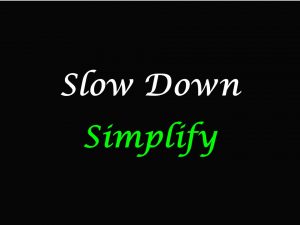A 5-step Program for What Ails us. Second Installment
Posted by Martin Ogle on Aug 22, 2019 in All Posts | Comments Off on A 5-step Program for What Ails us. Second Installment
 Step 2 – Slow down and simplify overall.
Step 2 – Slow down and simplify overall.
This is the second installment in a series of 5 musings under the theme of “A 5-step Program for What Ails Us.” The first installment introduced the theme an explored Step 1: “Yes, No or Maybe – be proactively honest, clear and respectful with ourselves and each other.” The titles of the remaining 3 installments are found at the end of this musing.
We are hurried; driven by and to distractions. We live in an increasingly impersonal world where face-to-face human interaction is being replaced with electronic intermediaries. We are increasingly inside and at the computer – not outside and walking – and thus in a different time frame than even recent generations let alone distant ancestors. With information overload and the harnessing of our brains to electronic time, our worries about the environment and climate change, the economy, crime and/or ourselves and families take on a pernicious, helpless quality . . . and we have less time to make sense of and address them.
I won’t try to document the above claims with footnotes and research because this musing is not meant to change your mind as to whether our lives are too hurried and distracted. It’s meant to help address this condition if you do see the above paragraph as a reality. If you disagree with the assessment, I’d only urge you to be open to the possibility that there are real trends of increased stress, detachment and hurriedness that are affecting people in significant ways even if you don’t experience it yourself.
I suggest that the forces that are speeding our personal lives are aligned with (and are often one and the same as) forces that stress and rupture our families and institutions, exacerbate social inequities and make our world unsustainable. That’s why I offer “slowing down” as part of “Step 2 for what ails us.” We need a “strategic retreat.” Can we draw back, not feel like we need to do so much, not surround ourselves with so much stuff and distractions? Can we be conservative with our time?
It’s not that we should stop doing, purchasing or using anything, for life inherently involves doing and using. In some areas of life, we need to do, use and even buy more! But, if nothing else, we need to simplify our lives so we can sort out what things really need our attention and then leave time and energy to devote to them. Even as we attend to important things, though, we should be aware that overdoing anything can be counterproductive. Consider this quote by theologian and social activist, Thomas Merton:
“There is a pervasive form of contemporary violence to which the idealist most easily succumbs: activism and overwork. The rush and pressure of modern life are a form, perhaps the most common form, of its innate violence. To allow oneself to be carried away by a multitude of conflicting concerns, to surrender to too many demands, to commit oneself to too many projects, to want to help everyone in everything, is to succumb to violence.” From “Conjectures of a Guilty Bystander” 1966.
These words were written two generations ago. Modern tools, such as the computer, allow us to be carried away with ever more projects. I am intensely aware, for instance, that it is easier for me to take on more and more writing projects with word processing capability than when all I had was pencil, paper and typewriter. I have to consciously limit those projects for which writing is an important part.
The pace of our lives often negatively affects even “Step 1” in this series of 5 blogs – our ability to be proactively honest, clear and respectful with each other. For instance, e-mail and social media allow us to make more commitments than ever before and then suck away so much time we don’t follow through on those commitments. Our ability to count on each other has been compromised, in direct relation to our ever-increasing tools and capacities to do more.
So as not to contribute to information overload, all I will offer here regarding our propensity to take on too much is to be aware how pervasive this is and then “just don’t do it.” Don’t take on too many commitments. Do say “no” if you’re already feeling overwhelmed or think you will be. As a turn on another phrase – “free up your time and your ass will follow!”
The second part of Step 2 is to “simplify overall.” Again, there is not much need to go into great detail. The massive amount of stuff in our lives stresses our personal relationships, stretches our time and energy keeping track of it all and ultimately is one of the biggest underlying causes of the horrific environmental trends we face. The pollution, habitat destruction, soil loss and other untenable trends that compromise are future are a result of our demands for so much stuff, so much convenience, so much fast-paced travel and entertainment and the like. So again, “just don’t do it.” Use the Marie Kondo method if you like. If you’re worried about giving up too much stuff, take your time and free yourself more gradually. Work with friends and family to do this together and make it fun. Don’t buy – or even acquire free – so much stuff. Another quote from an old, dead white guy: “It is the preoccupation with possessions, more than anything else, that prevents us from living freely and nobly.” ― Bertrand Russell.
To the extent you believe the need to slow down and simplify is a legitimate step towards curing what ails us, don’t analyze this issue any more or expect others to do so. If you’ve identified the need, just slow down and simplify to the extent you can. If you’re not so sure about the gravity of Step 2 at least be open to it!
If you disagree that your life is too cluttered or that hurriedness and stuff are a significant contributor to personal, community or world challenges, you probably haven’t gotten this far in the essay. But, if you have, at least be open to honoring that the lives of others might be too hurried and cluttered and don’t add to their load.
Slowing down and simplifying our lives are at the heart of addressing what ails us. We’ll not be able to devote the time and attention to steps 1, 3, 4 and 5 (see below) without this step.
Steps 1 and 3-5
Step 1) Yes, No or Maybe – be proactively honest, clear and respectful with ourselves and each other (See this Musing already up).
Step 3 – Spend more time outside, mostly nearby, including more physical exertion and labor.
Step 4 – Help envision and create an economy based on human well-being directly, not on growth for its own sake
Step 5 – Quickly empower youth create a new economy, not replicate the present one
(Steps 3-5 to be addressed in future Musings)






